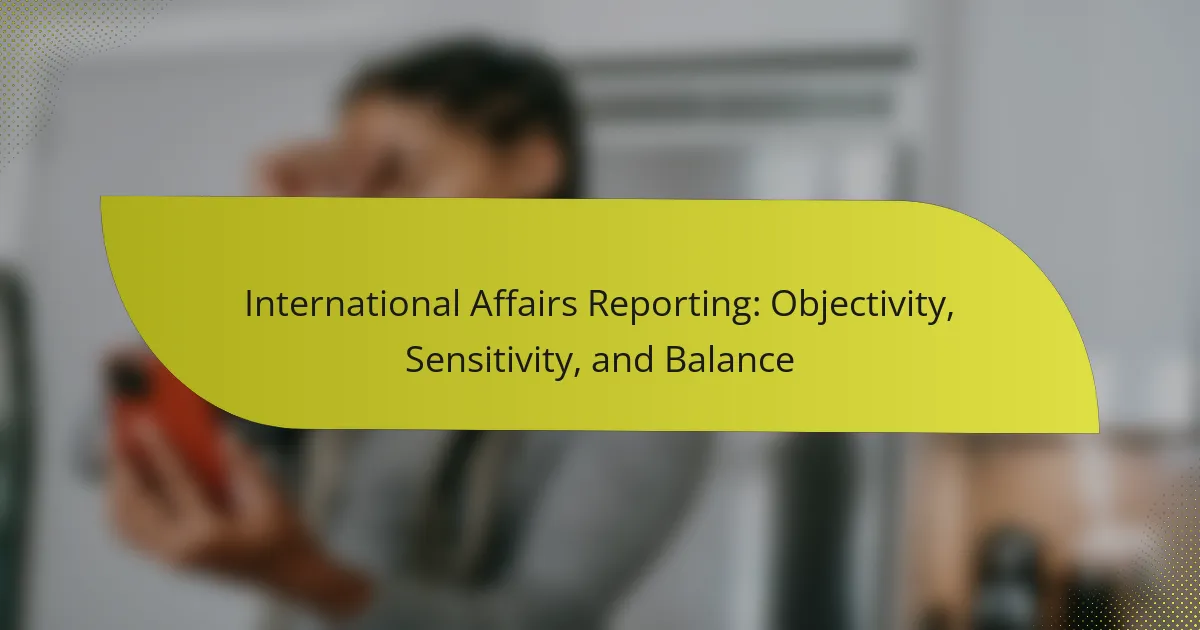International affairs reporting demands a commitment to objectivity, sensitivity, and balance to effectively inform audiences about complex global issues. By adhering to rigorous fact-checking and recognizing personal biases, journalists can present accurate and fair information. Additionally, understanding cultural nuances and incorporating diverse perspectives fosters a respectful and comprehensive portrayal of conflicts and their impacts.
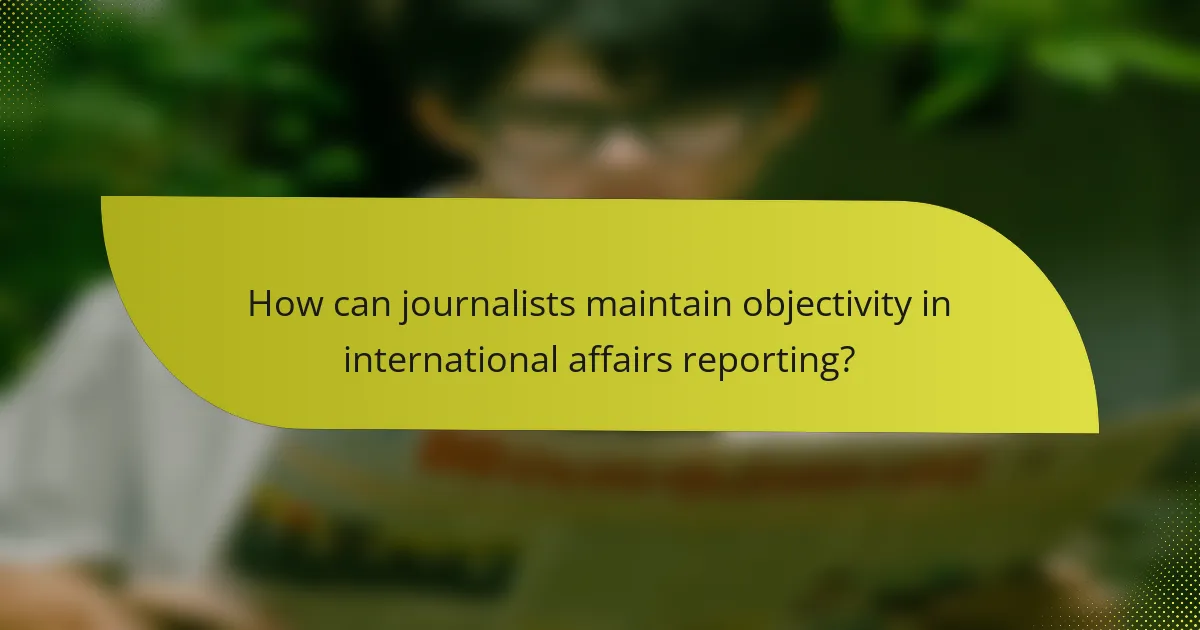
How can journalists maintain objectivity in international affairs reporting?
Journalists can maintain objectivity in international affairs reporting by adhering to rigorous standards of fact-checking, utilizing diverse sources, and recognizing personal biases. This commitment ensures that the information presented is accurate, balanced, and fair, fostering trust among audiences.
Fact-checking and verification
Fact-checking is essential for ensuring the accuracy of information in international reporting. Journalists should cross-reference facts with reliable sources, such as government reports, academic studies, and reputable news organizations. This process helps to eliminate misinformation and provides a solid foundation for reporting.
Verification can involve multiple steps, including sourcing original documents, consulting experts, and using tools to trace the origin of information. Journalists should be cautious of unverified claims, especially in fast-paced news cycles where misinformation can spread quickly.
Use of diverse sources
Utilizing a range of sources enhances the objectivity of international affairs reporting. Journalists should seek perspectives from various stakeholders, including government officials, local communities, NGOs, and independent experts. This approach helps to present a more comprehensive view of complex issues.
Incorporating diverse viewpoints can also mitigate bias. For instance, when covering a conflict, it is crucial to include voices from all sides to avoid portraying a one-dimensional narrative. This practice fosters a richer understanding of the situation and its implications.
Training in bias recognition
Training in bias recognition equips journalists with the skills to identify and mitigate their own biases. Workshops and seminars can help reporters understand how personal experiences and societal influences shape their perspectives. This awareness is crucial for producing balanced reporting.
Regular self-reflection and peer feedback can further enhance a journalist’s ability to recognize bias. By engaging in discussions about potential biases in reporting, journalists can develop strategies to counteract them, ensuring a more objective presentation of international affairs.
Adherence to ethical guidelines
Adhering to established ethical guidelines is fundamental for maintaining objectivity in reporting. Organizations like the Society of Professional Journalists and the International Federation of Journalists provide frameworks that emphasize truthfulness, accuracy, and fairness. Journalists should familiarize themselves with these guidelines and apply them consistently.
Ethical reporting also involves transparency about sources and potential conflicts of interest. By disclosing affiliations or biases, journalists can enhance their credibility and allow audiences to assess the reliability of the information presented.
Implementation of editorial oversight
Editorial oversight plays a critical role in ensuring objectivity in international reporting. Editors should review content for accuracy, balance, and adherence to ethical standards before publication. This process helps to catch potential biases and factual inaccuracies that may have been overlooked by the reporter.
Establishing a culture of accountability within news organizations can further strengthen editorial oversight. Regular training sessions and discussions about objectivity can empower journalists to uphold high standards in their reporting, ultimately benefiting the audience’s trust and understanding.
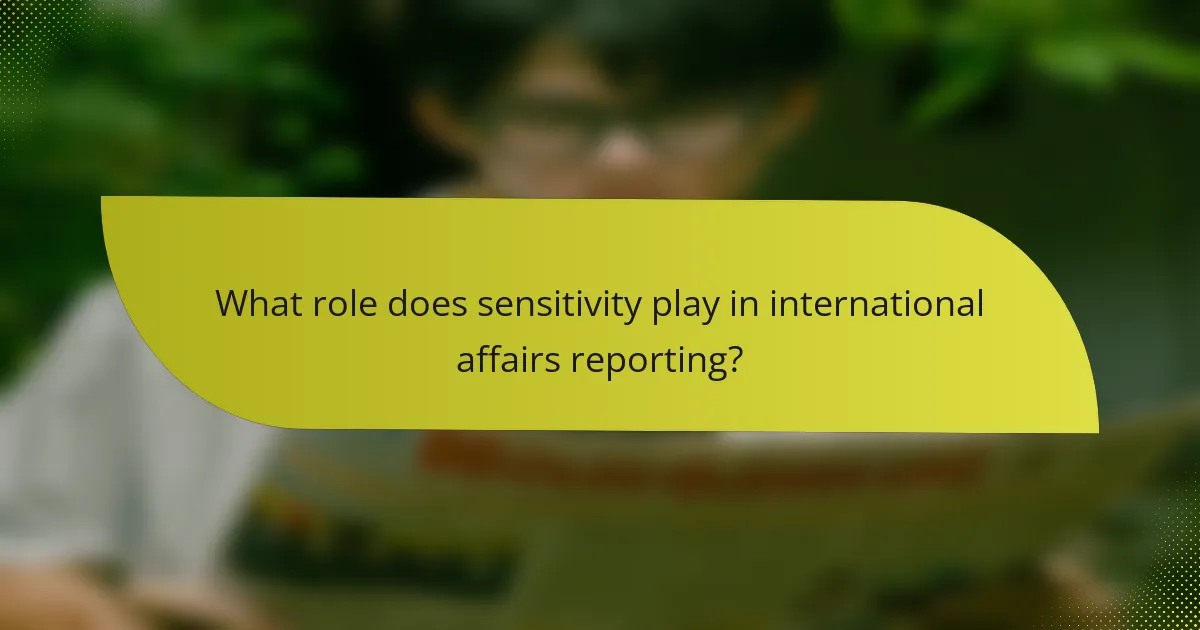
What role does sensitivity play in international affairs reporting?
Sensitivity in international affairs reporting is crucial for accurately conveying complex issues while respecting the diverse perspectives of affected populations. It involves understanding cultural nuances, acknowledging local customs, and being mindful of the emotional impact of reporting on trauma and conflict.
Understanding cultural contexts
Understanding cultural contexts is essential for effective international reporting. Journalists must familiarize themselves with the historical, social, and political backgrounds of the regions they cover. This knowledge helps avoid misinterpretations and ensures that stories resonate authentically with local audiences.
For example, using culturally relevant language and references can enhance the relatability of a report. Engaging with local experts or community members can provide deeper insights that enrich the narrative and promote accuracy.
Respecting local customs and values
Respecting local customs and values is vital for building trust with communities. Journalists should be aware of traditions, taboos, and social norms that may influence how information is received. This respect can prevent backlash and foster cooperative relationships with local sources.
For instance, in some cultures, discussing certain topics publicly may be considered disrespectful. Being sensitive to these customs can guide journalists in framing their stories appropriately, ensuring they do not inadvertently offend or alienate the audience.
Addressing trauma and conflict
Addressing trauma and conflict in reporting requires a delicate balance between informing the audience and being compassionate towards those affected. Journalists should approach sensitive subjects with care, avoiding sensationalism while highlighting the human impact of events.
When covering conflicts, it is beneficial to provide context about the historical grievances and current realities faced by communities. This approach not only informs readers but also honors the experiences of those involved, promoting a more nuanced understanding of the situation.
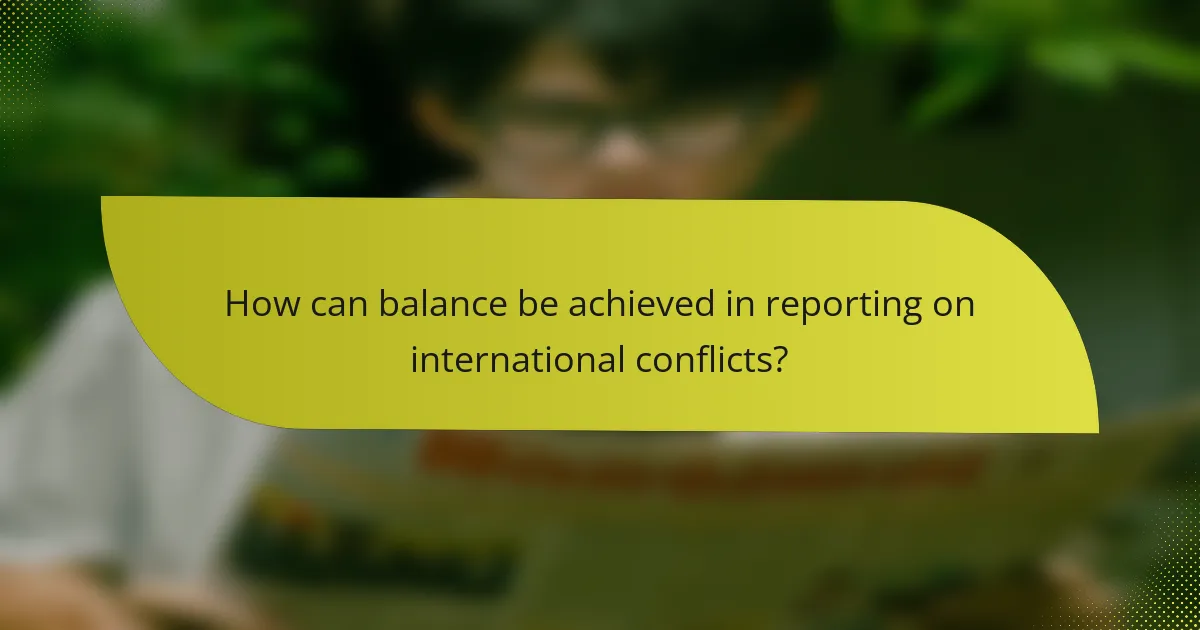
How can balance be achieved in reporting on international conflicts?
Balance in reporting on international conflicts can be achieved by presenting diverse viewpoints, avoiding sensationalist language, and incorporating expert analysis. This approach ensures that audiences receive a well-rounded understanding of complex issues.
Presenting multiple perspectives
To achieve balance, it is essential to present multiple perspectives on the conflict. This involves including voices from all sides, such as government officials, local populations, and international observers. By doing so, reporters can provide a more comprehensive view of the situation, helping audiences understand the motivations and consequences of different actions.
For example, when covering a conflict, a journalist might interview representatives from both opposing factions, as well as neutral parties like humanitarian organizations. This variety helps to avoid bias and fosters a more nuanced discussion.
Avoiding sensationalism
Avoiding sensationalism is crucial for balanced reporting. Sensationalist language can distort the reality of a situation, leading to misinterpretation and heightened tensions. Reporters should strive for clear, factual descriptions rather than emotionally charged language that may provoke fear or outrage.
For instance, instead of using phrases like “devastating attack,” a more measured approach would be to describe the event as “a significant military engagement.” This helps maintain objectivity and encourages informed discourse among readers.
Incorporating expert analysis
Incorporating expert analysis can enhance the depth and credibility of reporting on international conflicts. Experts, such as political analysts or historians, can provide context and insights that help audiences grasp the complexities of the situation. Their perspectives can clarify the implications of actions taken by various parties involved.
For effective reporting, journalists should seek out reputable experts and include their opinions in articles. This not only enriches the narrative but also helps to establish trust with the audience, as they see that the information is backed by knowledgeable sources.
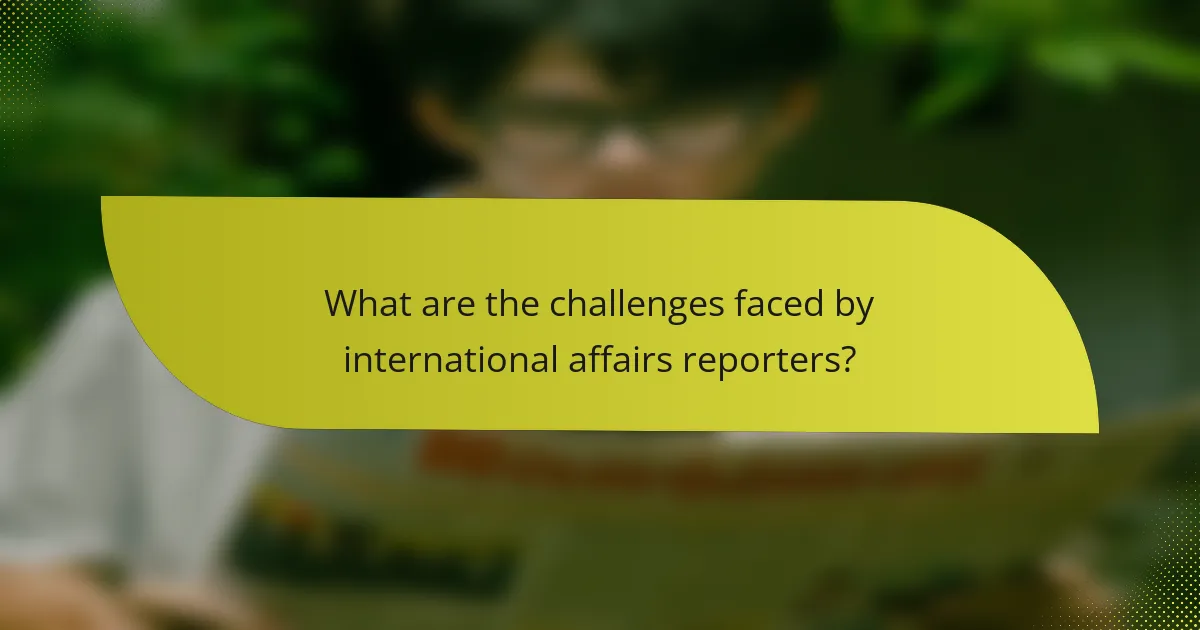
What are the challenges faced by international affairs reporters?
International affairs reporters encounter various challenges that can hinder their ability to deliver objective and balanced news. Key issues include access to reliable information, political pressures, censorship, and safety concerns in conflict zones.
Access to reliable information
Accessing reliable information is crucial for international affairs reporters, yet it can be difficult due to varying levels of transparency in different countries. Journalists often rely on official sources, local contacts, and independent organizations to verify facts, but these sources may not always be available or trustworthy.
To enhance information reliability, reporters should cross-check data from multiple sources and be aware of potential biases. Utilizing tools like fact-checking websites and databases can help ensure the accuracy of the information presented.
Political pressures and censorship
Political pressures and censorship pose significant challenges for international affairs reporters, particularly in authoritarian regimes. Governments may restrict access to information or manipulate narratives to control public perception, making it difficult for journalists to report freely.
Reporters must navigate these pressures by developing strong networks and understanding the political landscape. They should be cautious about the implications of their reporting and consider using anonymous sources when necessary to protect their informants and themselves.
Safety concerns in conflict zones
Safety is a paramount concern for international affairs reporters working in conflict zones. The risk of violence, kidnapping, and harassment can be high, requiring journalists to take extensive precautions before and during their assignments.
To mitigate risks, reporters should undergo safety training, carry emergency supplies, and maintain communication with their news organizations. Establishing a clear evacuation plan and staying informed about local conditions can further enhance their safety while reporting in volatile environments.
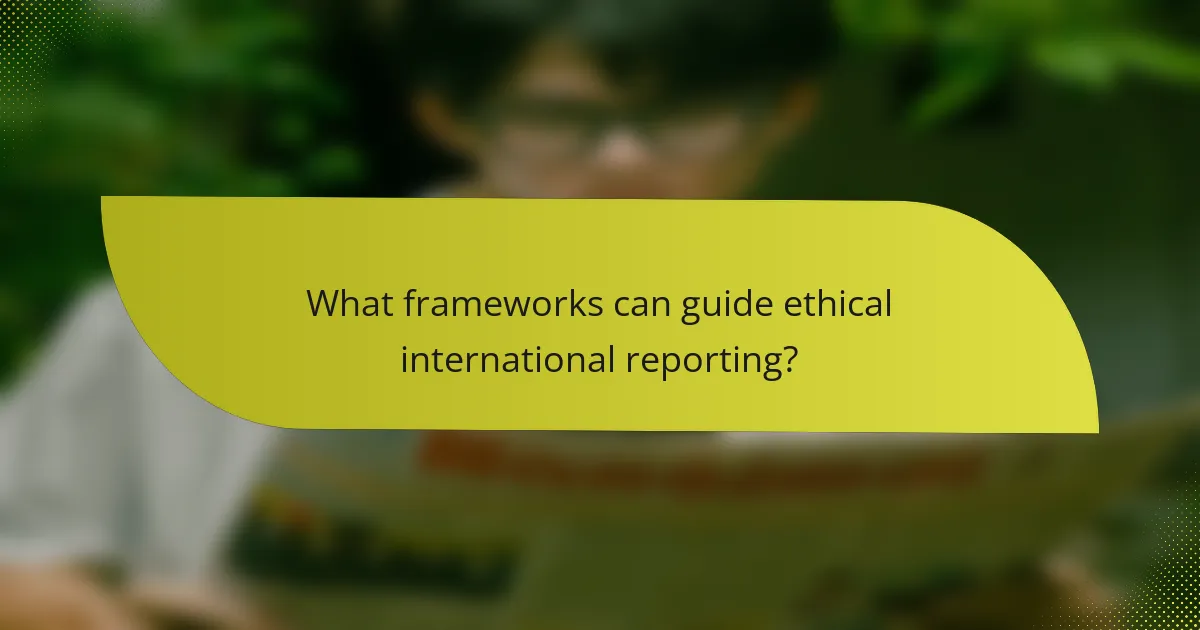
What frameworks can guide ethical international reporting?
Ethical international reporting can be guided by several established frameworks that emphasize objectivity, sensitivity, and balance. These frameworks provide journalists with principles to navigate complex global issues while maintaining integrity and respect for diverse cultures.
SPJ Code of Ethics
The Society of Professional Journalists (SPJ) Code of Ethics outlines key principles for ethical journalism, including seeking truth, minimizing harm, and acting independently. Journalists are encouraged to provide accurate information while being sensitive to the impact their reporting may have on individuals and communities.
For example, when covering conflicts, journalists should avoid sensationalism and strive to present multiple perspectives. This helps ensure that the reporting does not exacerbate tensions or misrepresent the complexities of the situation.
RTDNA Guidelines
The Radio Television Digital News Association (RTDNA) Guidelines emphasize the importance of fairness and accuracy in reporting. These guidelines encourage journalists to verify information before dissemination and to provide context to avoid misleading audiences.
In practice, this means journalists should cross-check facts with multiple reliable sources and be transparent about their reporting processes. For instance, when reporting on international crises, it is crucial to clarify the sources of information to maintain credibility.
UNESCO Principles for Journalism
UNESCO’s Principles for Journalism advocate for the promotion of freedom of expression and the right to information. These principles highlight the need for journalists to respect cultural differences and to report in ways that foster understanding and dialogue.
Journalists should be aware of the cultural sensitivities surrounding the topics they cover, especially in diverse regions. For example, when reporting on human rights issues, it is vital to approach the subject with respect for local customs and beliefs, ensuring that the voices of affected communities are heard and represented accurately.
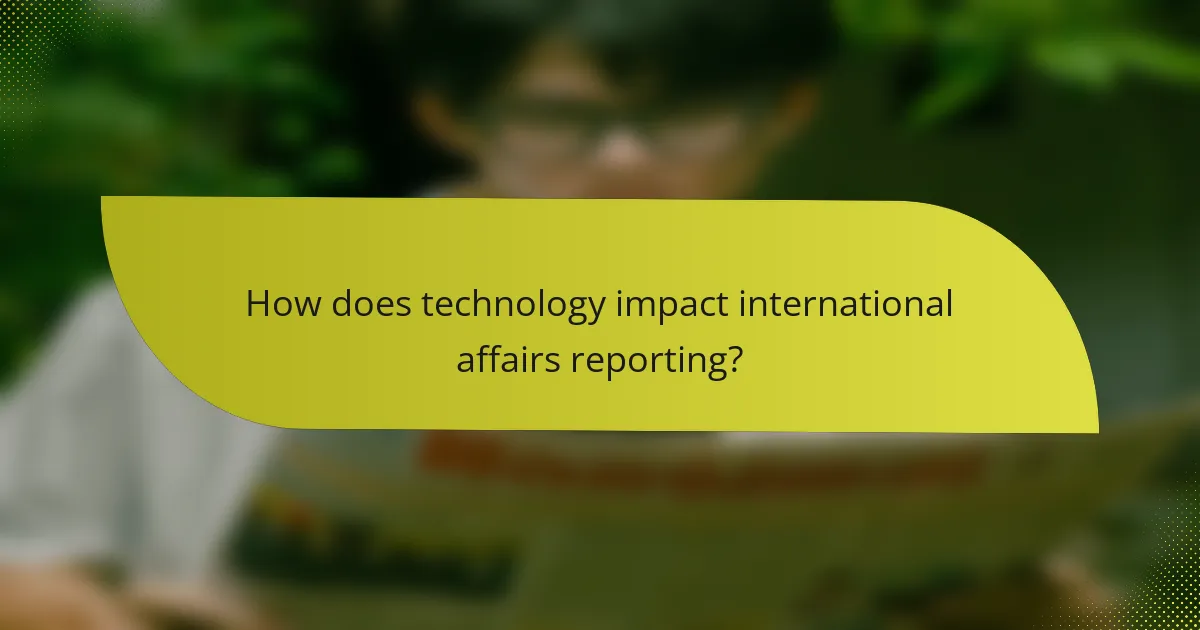
How does technology impact international affairs reporting?
Technology significantly influences international affairs reporting by enhancing the speed, reach, and accessibility of information. It allows journalists to gather data from diverse sources, engage with global audiences, and report in real-time, but it also presents challenges related to accuracy and bias.
Speed of Information Dissemination
The advent of digital platforms has accelerated the dissemination of news, enabling reporters to share updates almost instantaneously. This immediacy can be beneficial during crises or breaking news events, where timely information is crucial for public awareness.
However, the rush to publish can lead to the spread of misinformation. Journalists must balance the need for speed with the necessity of verifying facts before reporting, ensuring that accuracy is not sacrificed for immediacy.
Access to Diverse Sources
Technology provides journalists with access to a wide array of sources, including social media, online databases, and international news outlets. This variety allows for a more comprehensive understanding of global issues and perspectives.
Yet, reliance on digital sources can introduce biases, as not all information is equally credible. Reporters should critically evaluate sources and strive for a balanced representation of viewpoints to maintain objectivity in their reporting.
Engagement with Global Audiences
Digital platforms enable journalists to engage directly with audiences worldwide, fostering dialogue and feedback. This interaction can enhance the relevance of reporting and encourage a more informed public.
However, journalists must navigate the complexities of audience engagement, including managing differing cultural sensitivities and expectations. Understanding the audience’s context is essential to ensure that reporting resonates appropriately across diverse communities.
Challenges of Misinformation
With the rapid spread of information comes the risk of misinformation, which can distort public perception and influence international relations. Journalists face the challenge of distinguishing credible information from false narratives.
To combat misinformation, reporters should implement rigorous fact-checking processes and utilize reliable sources. They can also educate their audiences on identifying credible information, promoting media literacy as a vital component of responsible reporting.
